Business and Corporation Law Assignment: Case Analysis & Solutions
VerifiedAdded on 2023/01/10
|8
|2316
|61
Homework Assignment
AI Summary
This document presents a comprehensive solution to a Business and Corporation Law assignment, addressing two distinct case studies. The first case examines the implications of a restraint of trade clause and the potential for lifting the corporate veil to hold an individual liable for actions taken through a company. It analyzes the principles established in cases like Salomon v Salomon & Co Ltd and Gilford Motor Co Ltd v Horne, concluding that the individual likely violated the clause. The second case explores partnership law, focusing on the liabilities of partners for actions taken by other partners. It analyzes the provisions of the Partnership Act 1892 (NSW), emphasizing joint and several liability and fiduciary duties, referencing cases like Mercantile Credit Ltd v Garrod and Birtchnell v Equity Trustees, Executors & Agency Co Ltd. The solution provides detailed legal analysis and applications of relevant case law to determine the liabilities of each partner based on their actions within the partnership.

0
Business and Corporation Law
Business and Corporation Law
Paraphrase This Document
Need a fresh take? Get an instant paraphrase of this document with our AI Paraphraser
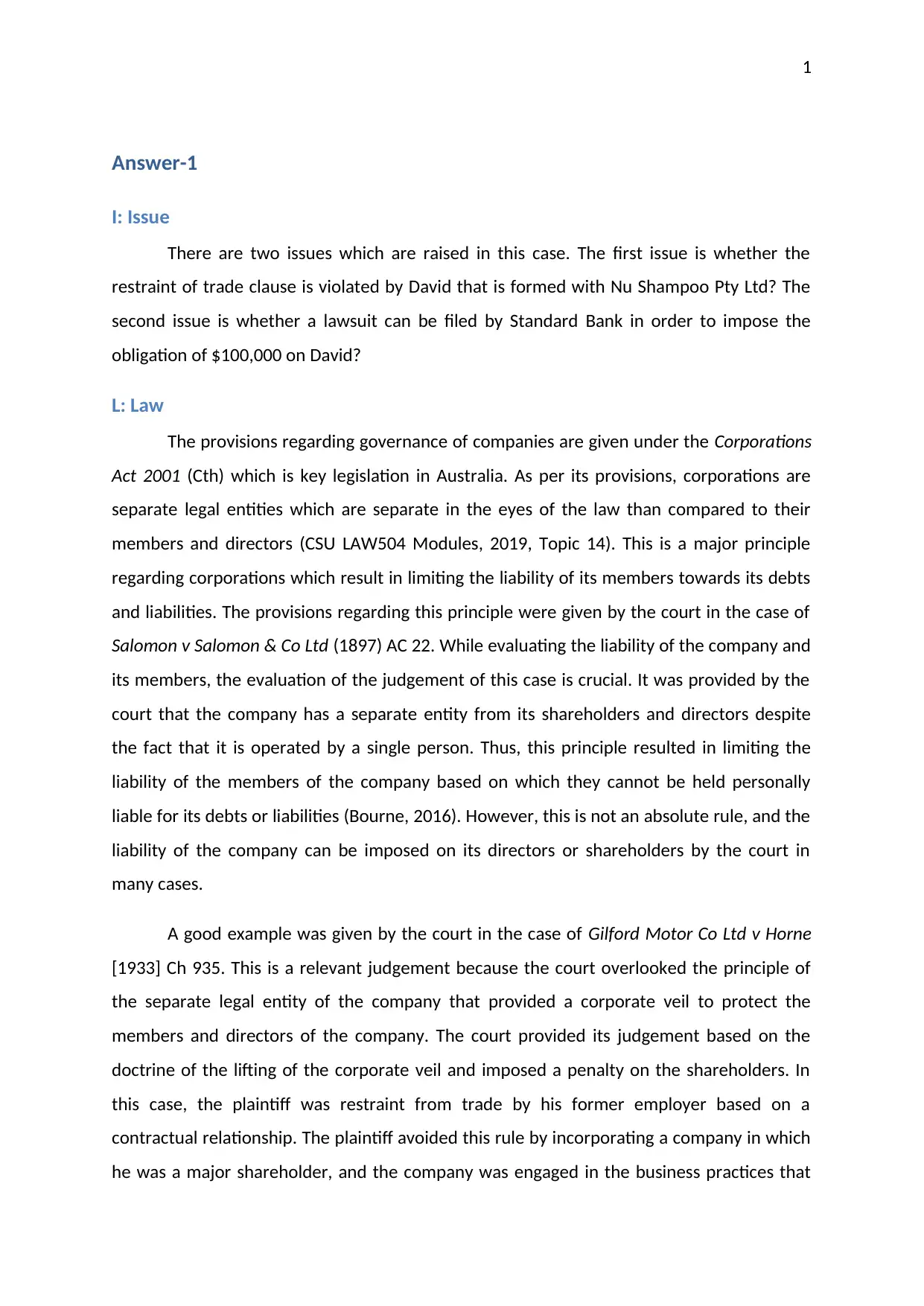
1
Answer-1
I: Issue
There are two issues which are raised in this case. The first issue is whether the
restraint of trade clause is violated by David that is formed with Nu Shampoo Pty Ltd? The
second issue is whether a lawsuit can be filed by Standard Bank in order to impose the
obligation of $100,000 on David?
L: Law
The provisions regarding governance of companies are given under the Corporations
Act 2001 (Cth) which is key legislation in Australia. As per its provisions, corporations are
separate legal entities which are separate in the eyes of the law than compared to their
members and directors (CSU LAW504 Modules, 2019, Topic 14). This is a major principle
regarding corporations which result in limiting the liability of its members towards its debts
and liabilities. The provisions regarding this principle were given by the court in the case of
Salomon v Salomon & Co Ltd (1897) AC 22. While evaluating the liability of the company and
its members, the evaluation of the judgement of this case is crucial. It was provided by the
court that the company has a separate entity from its shareholders and directors despite
the fact that it is operated by a single person. Thus, this principle resulted in limiting the
liability of the members of the company based on which they cannot be held personally
liable for its debts or liabilities (Bourne, 2016). However, this is not an absolute rule, and the
liability of the company can be imposed on its directors or shareholders by the court in
many cases.
A good example was given by the court in the case of Gilford Motor Co Ltd v Horne
[1933] Ch 935. This is a relevant judgement because the court overlooked the principle of
the separate legal entity of the company that provided a corporate veil to protect the
members and directors of the company. The court provided its judgement based on the
doctrine of the lifting of the corporate veil and imposed a penalty on the shareholders. In
this case, the plaintiff was restraint from trade by his former employer based on a
contractual relationship. The plaintiff avoided this rule by incorporating a company in which
he was a major shareholder, and the company was engaged in the business practices that
Answer-1
I: Issue
There are two issues which are raised in this case. The first issue is whether the
restraint of trade clause is violated by David that is formed with Nu Shampoo Pty Ltd? The
second issue is whether a lawsuit can be filed by Standard Bank in order to impose the
obligation of $100,000 on David?
L: Law
The provisions regarding governance of companies are given under the Corporations
Act 2001 (Cth) which is key legislation in Australia. As per its provisions, corporations are
separate legal entities which are separate in the eyes of the law than compared to their
members and directors (CSU LAW504 Modules, 2019, Topic 14). This is a major principle
regarding corporations which result in limiting the liability of its members towards its debts
and liabilities. The provisions regarding this principle were given by the court in the case of
Salomon v Salomon & Co Ltd (1897) AC 22. While evaluating the liability of the company and
its members, the evaluation of the judgement of this case is crucial. It was provided by the
court that the company has a separate entity from its shareholders and directors despite
the fact that it is operated by a single person. Thus, this principle resulted in limiting the
liability of the members of the company based on which they cannot be held personally
liable for its debts or liabilities (Bourne, 2016). However, this is not an absolute rule, and the
liability of the company can be imposed on its directors or shareholders by the court in
many cases.
A good example was given by the court in the case of Gilford Motor Co Ltd v Horne
[1933] Ch 935. This is a relevant judgement because the court overlooked the principle of
the separate legal entity of the company that provided a corporate veil to protect the
members and directors of the company. The court provided its judgement based on the
doctrine of the lifting of the corporate veil and imposed a penalty on the shareholders. In
this case, the plaintiff was restraint from trade by his former employer based on a
contractual relationship. The plaintiff avoided this rule by incorporating a company in which
he was a major shareholder, and the company was engaged in the business practices that
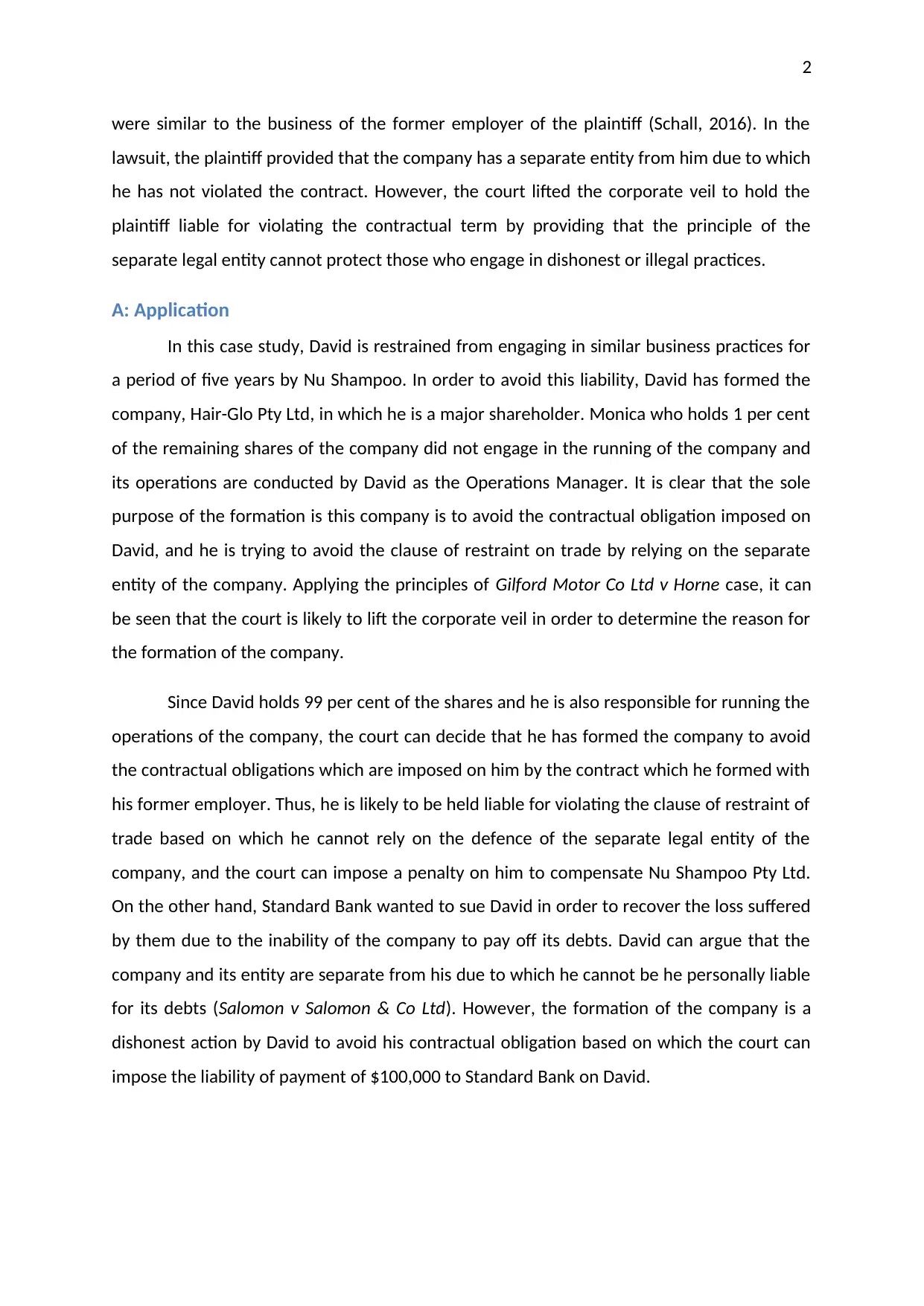
2
were similar to the business of the former employer of the plaintiff (Schall, 2016). In the
lawsuit, the plaintiff provided that the company has a separate entity from him due to which
he has not violated the contract. However, the court lifted the corporate veil to hold the
plaintiff liable for violating the contractual term by providing that the principle of the
separate legal entity cannot protect those who engage in dishonest or illegal practices.
A: Application
In this case study, David is restrained from engaging in similar business practices for
a period of five years by Nu Shampoo. In order to avoid this liability, David has formed the
company, Hair-Glo Pty Ltd, in which he is a major shareholder. Monica who holds 1 per cent
of the remaining shares of the company did not engage in the running of the company and
its operations are conducted by David as the Operations Manager. It is clear that the sole
purpose of the formation is this company is to avoid the contractual obligation imposed on
David, and he is trying to avoid the clause of restraint on trade by relying on the separate
entity of the company. Applying the principles of Gilford Motor Co Ltd v Horne case, it can
be seen that the court is likely to lift the corporate veil in order to determine the reason for
the formation of the company.
Since David holds 99 per cent of the shares and he is also responsible for running the
operations of the company, the court can decide that he has formed the company to avoid
the contractual obligations which are imposed on him by the contract which he formed with
his former employer. Thus, he is likely to be held liable for violating the clause of restraint of
trade based on which he cannot rely on the defence of the separate legal entity of the
company, and the court can impose a penalty on him to compensate Nu Shampoo Pty Ltd.
On the other hand, Standard Bank wanted to sue David in order to recover the loss suffered
by them due to the inability of the company to pay off its debts. David can argue that the
company and its entity are separate from his due to which he cannot be he personally liable
for its debts (Salomon v Salomon & Co Ltd). However, the formation of the company is a
dishonest action by David to avoid his contractual obligation based on which the court can
impose the liability of payment of $100,000 to Standard Bank on David.
were similar to the business of the former employer of the plaintiff (Schall, 2016). In the
lawsuit, the plaintiff provided that the company has a separate entity from him due to which
he has not violated the contract. However, the court lifted the corporate veil to hold the
plaintiff liable for violating the contractual term by providing that the principle of the
separate legal entity cannot protect those who engage in dishonest or illegal practices.
A: Application
In this case study, David is restrained from engaging in similar business practices for
a period of five years by Nu Shampoo. In order to avoid this liability, David has formed the
company, Hair-Glo Pty Ltd, in which he is a major shareholder. Monica who holds 1 per cent
of the remaining shares of the company did not engage in the running of the company and
its operations are conducted by David as the Operations Manager. It is clear that the sole
purpose of the formation is this company is to avoid the contractual obligation imposed on
David, and he is trying to avoid the clause of restraint on trade by relying on the separate
entity of the company. Applying the principles of Gilford Motor Co Ltd v Horne case, it can
be seen that the court is likely to lift the corporate veil in order to determine the reason for
the formation of the company.
Since David holds 99 per cent of the shares and he is also responsible for running the
operations of the company, the court can decide that he has formed the company to avoid
the contractual obligations which are imposed on him by the contract which he formed with
his former employer. Thus, he is likely to be held liable for violating the clause of restraint of
trade based on which he cannot rely on the defence of the separate legal entity of the
company, and the court can impose a penalty on him to compensate Nu Shampoo Pty Ltd.
On the other hand, Standard Bank wanted to sue David in order to recover the loss suffered
by them due to the inability of the company to pay off its debts. David can argue that the
company and its entity are separate from his due to which he cannot be he personally liable
for its debts (Salomon v Salomon & Co Ltd). However, the formation of the company is a
dishonest action by David to avoid his contractual obligation based on which the court can
impose the liability of payment of $100,000 to Standard Bank on David.
⊘ This is a preview!⊘
Do you want full access?
Subscribe today to unlock all pages.

Trusted by 1+ million students worldwide
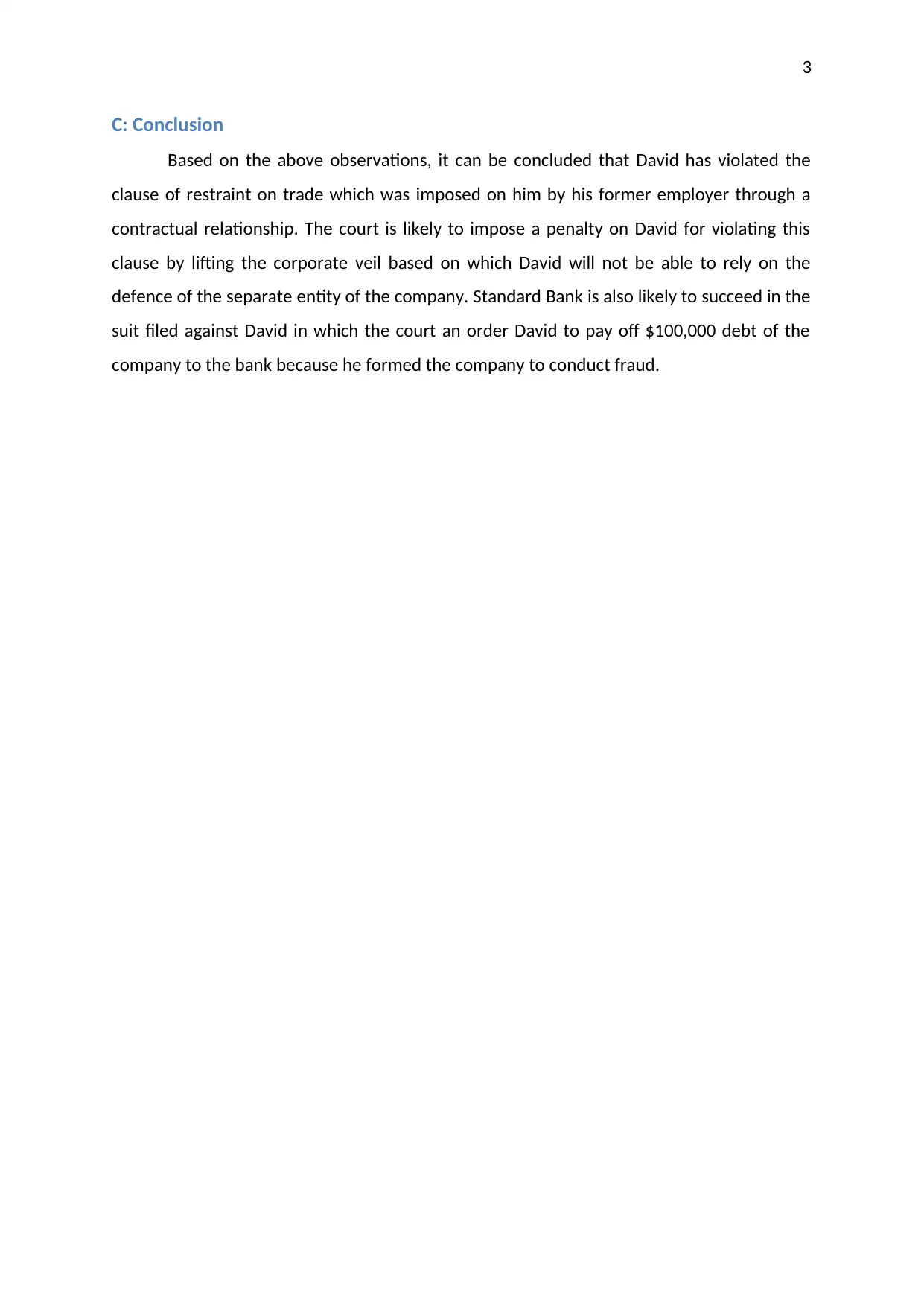
3
C: Conclusion
Based on the above observations, it can be concluded that David has violated the
clause of restraint on trade which was imposed on him by his former employer through a
contractual relationship. The court is likely to impose a penalty on David for violating this
clause by lifting the corporate veil based on which David will not be able to rely on the
defence of the separate entity of the company. Standard Bank is also likely to succeed in the
suit filed against David in which the court an order David to pay off $100,000 debt of the
company to the bank because he formed the company to conduct fraud.
C: Conclusion
Based on the above observations, it can be concluded that David has violated the
clause of restraint on trade which was imposed on him by his former employer through a
contractual relationship. The court is likely to impose a penalty on David for violating this
clause by lifting the corporate veil based on which David will not be able to rely on the
defence of the separate entity of the company. Standard Bank is also likely to succeed in the
suit filed against David in which the court an order David to pay off $100,000 debt of the
company to the bank because he formed the company to conduct fraud.
Paraphrase This Document
Need a fresh take? Get an instant paraphrase of this document with our AI Paraphraser
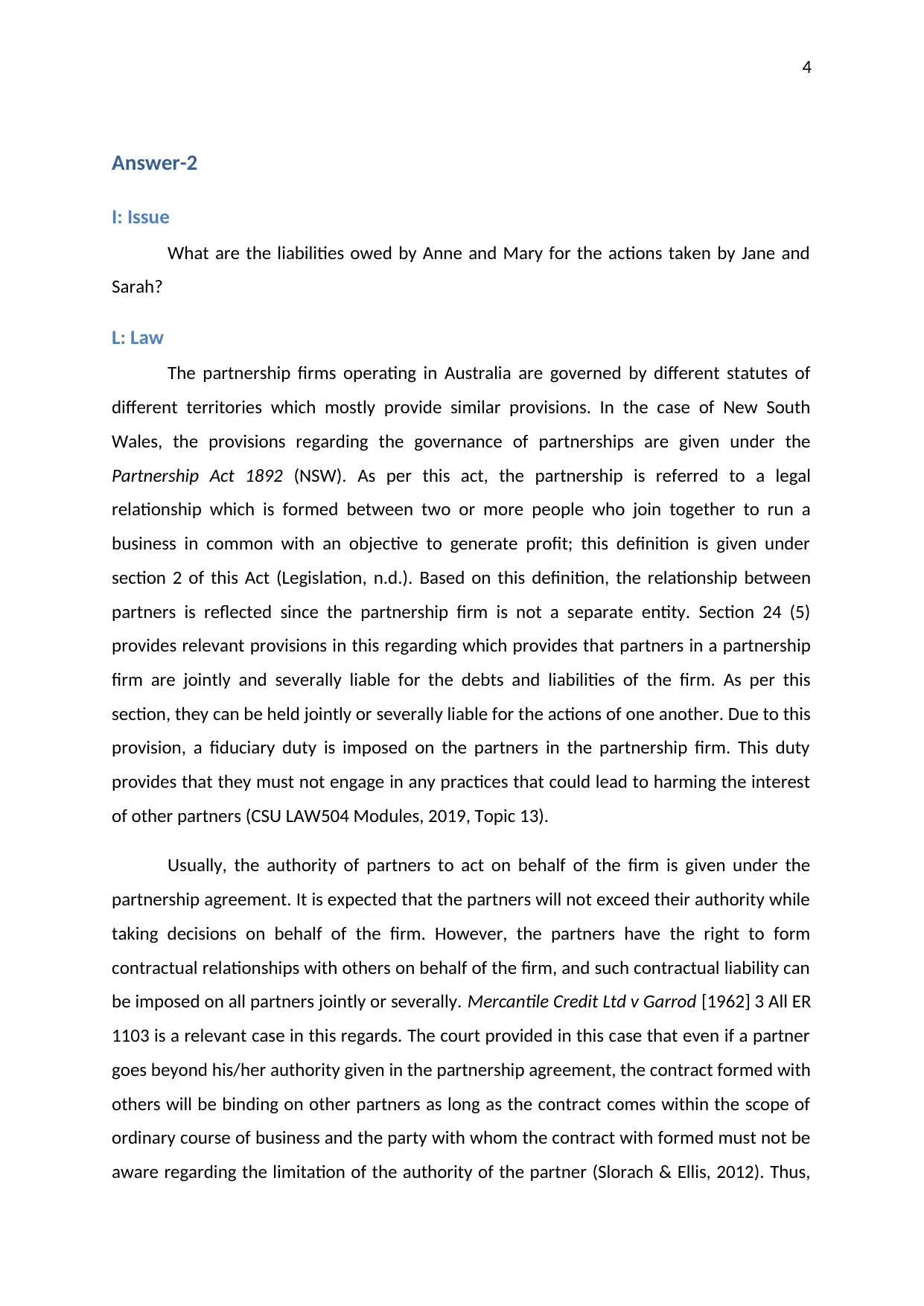
4
Answer-2
I: Issue
What are the liabilities owed by Anne and Mary for the actions taken by Jane and
Sarah?
L: Law
The partnership firms operating in Australia are governed by different statutes of
different territories which mostly provide similar provisions. In the case of New South
Wales, the provisions regarding the governance of partnerships are given under the
Partnership Act 1892 (NSW). As per this act, the partnership is referred to a legal
relationship which is formed between two or more people who join together to run a
business in common with an objective to generate profit; this definition is given under
section 2 of this Act (Legislation, n.d.). Based on this definition, the relationship between
partners is reflected since the partnership firm is not a separate entity. Section 24 (5)
provides relevant provisions in this regarding which provides that partners in a partnership
firm are jointly and severally liable for the debts and liabilities of the firm. As per this
section, they can be held jointly or severally liable for the actions of one another. Due to this
provision, a fiduciary duty is imposed on the partners in the partnership firm. This duty
provides that they must not engage in any practices that could lead to harming the interest
of other partners (CSU LAW504 Modules, 2019, Topic 13).
Usually, the authority of partners to act on behalf of the firm is given under the
partnership agreement. It is expected that the partners will not exceed their authority while
taking decisions on behalf of the firm. However, the partners have the right to form
contractual relationships with others on behalf of the firm, and such contractual liability can
be imposed on all partners jointly or severally. Mercantile Credit Ltd v Garrod [1962] 3 All ER
1103 is a relevant case in this regards. The court provided in this case that even if a partner
goes beyond his/her authority given in the partnership agreement, the contract formed with
others will be binding on other partners as long as the contract comes within the scope of
ordinary course of business and the party with whom the contract with formed must not be
aware regarding the limitation of the authority of the partner (Slorach & Ellis, 2012). Thus,
Answer-2
I: Issue
What are the liabilities owed by Anne and Mary for the actions taken by Jane and
Sarah?
L: Law
The partnership firms operating in Australia are governed by different statutes of
different territories which mostly provide similar provisions. In the case of New South
Wales, the provisions regarding the governance of partnerships are given under the
Partnership Act 1892 (NSW). As per this act, the partnership is referred to a legal
relationship which is formed between two or more people who join together to run a
business in common with an objective to generate profit; this definition is given under
section 2 of this Act (Legislation, n.d.). Based on this definition, the relationship between
partners is reflected since the partnership firm is not a separate entity. Section 24 (5)
provides relevant provisions in this regarding which provides that partners in a partnership
firm are jointly and severally liable for the debts and liabilities of the firm. As per this
section, they can be held jointly or severally liable for the actions of one another. Due to this
provision, a fiduciary duty is imposed on the partners in the partnership firm. This duty
provides that they must not engage in any practices that could lead to harming the interest
of other partners (CSU LAW504 Modules, 2019, Topic 13).
Usually, the authority of partners to act on behalf of the firm is given under the
partnership agreement. It is expected that the partners will not exceed their authority while
taking decisions on behalf of the firm. However, the partners have the right to form
contractual relationships with others on behalf of the firm, and such contractual liability can
be imposed on all partners jointly or severally. Mercantile Credit Ltd v Garrod [1962] 3 All ER
1103 is a relevant case in this regards. The court provided in this case that even if a partner
goes beyond his/her authority given in the partnership agreement, the contract formed with
others will be binding on other partners as long as the contract comes within the scope of
ordinary course of business and the party with whom the contract with formed must not be
aware regarding the limitation of the authority of the partner (Slorach & Ellis, 2012). Thus,
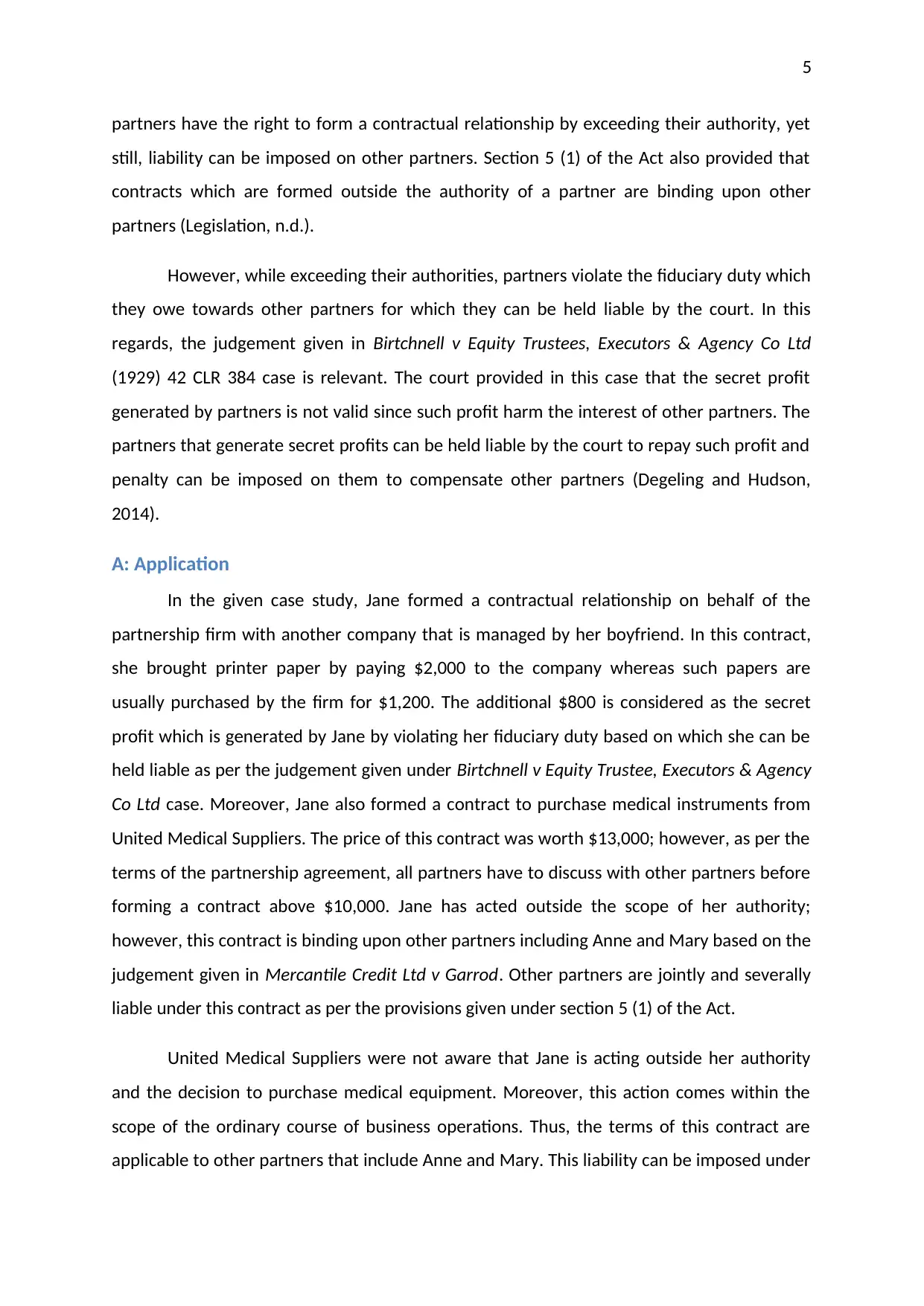
5
partners have the right to form a contractual relationship by exceeding their authority, yet
still, liability can be imposed on other partners. Section 5 (1) of the Act also provided that
contracts which are formed outside the authority of a partner are binding upon other
partners (Legislation, n.d.).
However, while exceeding their authorities, partners violate the fiduciary duty which
they owe towards other partners for which they can be held liable by the court. In this
regards, the judgement given in Birtchnell v Equity Trustees, Executors & Agency Co Ltd
(1929) 42 CLR 384 case is relevant. The court provided in this case that the secret profit
generated by partners is not valid since such profit harm the interest of other partners. The
partners that generate secret profits can be held liable by the court to repay such profit and
penalty can be imposed on them to compensate other partners (Degeling and Hudson,
2014).
A: Application
In the given case study, Jane formed a contractual relationship on behalf of the
partnership firm with another company that is managed by her boyfriend. In this contract,
she brought printer paper by paying $2,000 to the company whereas such papers are
usually purchased by the firm for $1,200. The additional $800 is considered as the secret
profit which is generated by Jane by violating her fiduciary duty based on which she can be
held liable as per the judgement given under Birtchnell v Equity Trustee, Executors & Agency
Co Ltd case. Moreover, Jane also formed a contract to purchase medical instruments from
United Medical Suppliers. The price of this contract was worth $13,000; however, as per the
terms of the partnership agreement, all partners have to discuss with other partners before
forming a contract above $10,000. Jane has acted outside the scope of her authority;
however, this contract is binding upon other partners including Anne and Mary based on the
judgement given in Mercantile Credit Ltd v Garrod. Other partners are jointly and severally
liable under this contract as per the provisions given under section 5 (1) of the Act.
United Medical Suppliers were not aware that Jane is acting outside her authority
and the decision to purchase medical equipment. Moreover, this action comes within the
scope of the ordinary course of business operations. Thus, the terms of this contract are
applicable to other partners that include Anne and Mary. This liability can be imposed under
partners have the right to form a contractual relationship by exceeding their authority, yet
still, liability can be imposed on other partners. Section 5 (1) of the Act also provided that
contracts which are formed outside the authority of a partner are binding upon other
partners (Legislation, n.d.).
However, while exceeding their authorities, partners violate the fiduciary duty which
they owe towards other partners for which they can be held liable by the court. In this
regards, the judgement given in Birtchnell v Equity Trustees, Executors & Agency Co Ltd
(1929) 42 CLR 384 case is relevant. The court provided in this case that the secret profit
generated by partners is not valid since such profit harm the interest of other partners. The
partners that generate secret profits can be held liable by the court to repay such profit and
penalty can be imposed on them to compensate other partners (Degeling and Hudson,
2014).
A: Application
In the given case study, Jane formed a contractual relationship on behalf of the
partnership firm with another company that is managed by her boyfriend. In this contract,
she brought printer paper by paying $2,000 to the company whereas such papers are
usually purchased by the firm for $1,200. The additional $800 is considered as the secret
profit which is generated by Jane by violating her fiduciary duty based on which she can be
held liable as per the judgement given under Birtchnell v Equity Trustee, Executors & Agency
Co Ltd case. Moreover, Jane also formed a contract to purchase medical instruments from
United Medical Suppliers. The price of this contract was worth $13,000; however, as per the
terms of the partnership agreement, all partners have to discuss with other partners before
forming a contract above $10,000. Jane has acted outside the scope of her authority;
however, this contract is binding upon other partners including Anne and Mary based on the
judgement given in Mercantile Credit Ltd v Garrod. Other partners are jointly and severally
liable under this contract as per the provisions given under section 5 (1) of the Act.
United Medical Suppliers were not aware that Jane is acting outside her authority
and the decision to purchase medical equipment. Moreover, this action comes within the
scope of the ordinary course of business operations. Thus, the terms of this contract are
applicable to other partners that include Anne and Mary. This liability can be imposed under
⊘ This is a preview!⊘
Do you want full access?
Subscribe today to unlock all pages.

Trusted by 1+ million students worldwide
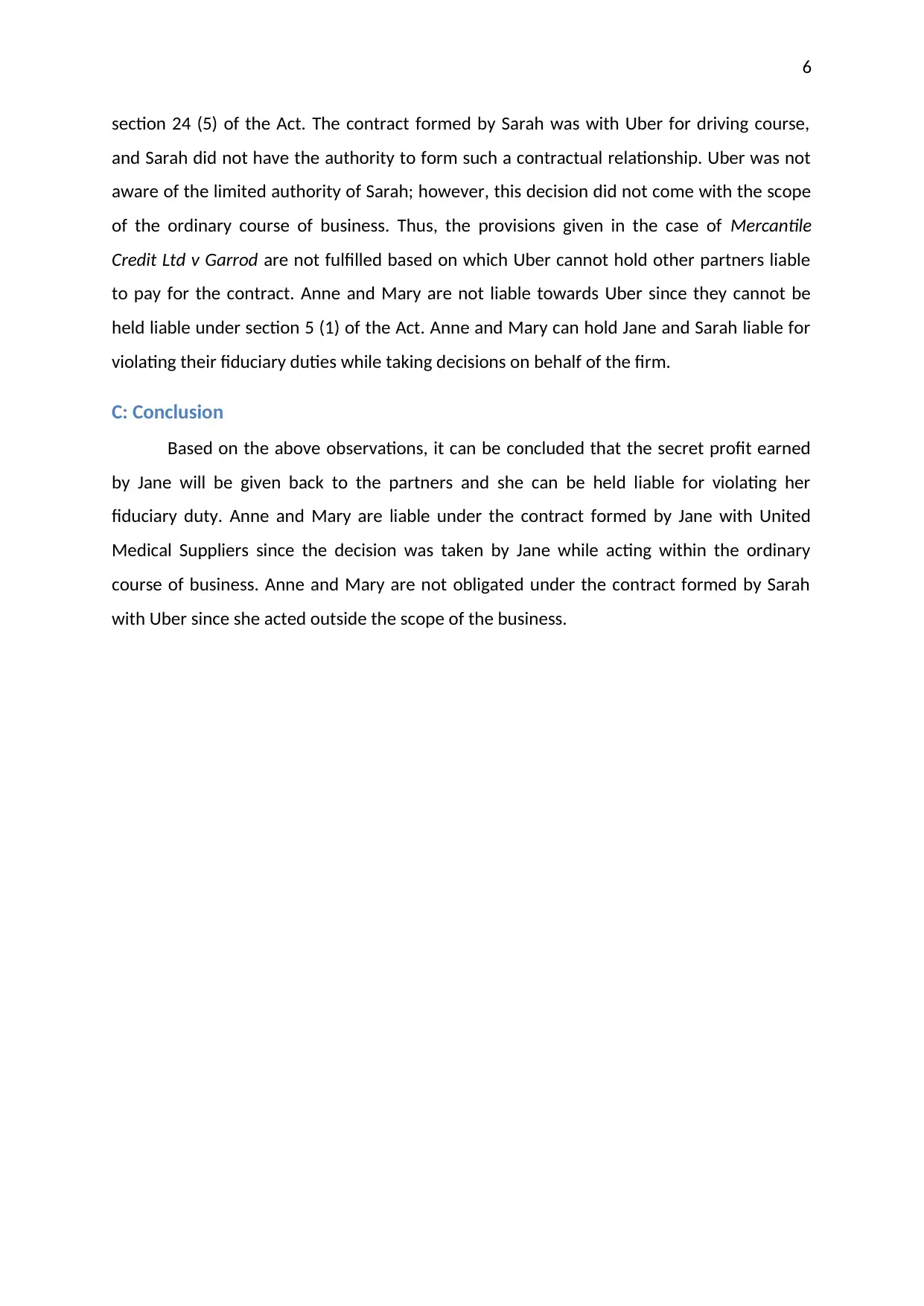
6
section 24 (5) of the Act. The contract formed by Sarah was with Uber for driving course,
and Sarah did not have the authority to form such a contractual relationship. Uber was not
aware of the limited authority of Sarah; however, this decision did not come with the scope
of the ordinary course of business. Thus, the provisions given in the case of Mercantile
Credit Ltd v Garrod are not fulfilled based on which Uber cannot hold other partners liable
to pay for the contract. Anne and Mary are not liable towards Uber since they cannot be
held liable under section 5 (1) of the Act. Anne and Mary can hold Jane and Sarah liable for
violating their fiduciary duties while taking decisions on behalf of the firm.
C: Conclusion
Based on the above observations, it can be concluded that the secret profit earned
by Jane will be given back to the partners and she can be held liable for violating her
fiduciary duty. Anne and Mary are liable under the contract formed by Jane with United
Medical Suppliers since the decision was taken by Jane while acting within the ordinary
course of business. Anne and Mary are not obligated under the contract formed by Sarah
with Uber since she acted outside the scope of the business.
section 24 (5) of the Act. The contract formed by Sarah was with Uber for driving course,
and Sarah did not have the authority to form such a contractual relationship. Uber was not
aware of the limited authority of Sarah; however, this decision did not come with the scope
of the ordinary course of business. Thus, the provisions given in the case of Mercantile
Credit Ltd v Garrod are not fulfilled based on which Uber cannot hold other partners liable
to pay for the contract. Anne and Mary are not liable towards Uber since they cannot be
held liable under section 5 (1) of the Act. Anne and Mary can hold Jane and Sarah liable for
violating their fiduciary duties while taking decisions on behalf of the firm.
C: Conclusion
Based on the above observations, it can be concluded that the secret profit earned
by Jane will be given back to the partners and she can be held liable for violating her
fiduciary duty. Anne and Mary are liable under the contract formed by Jane with United
Medical Suppliers since the decision was taken by Jane while acting within the ordinary
course of business. Anne and Mary are not obligated under the contract formed by Sarah
with Uber since she acted outside the scope of the business.
Paraphrase This Document
Need a fresh take? Get an instant paraphrase of this document with our AI Paraphraser
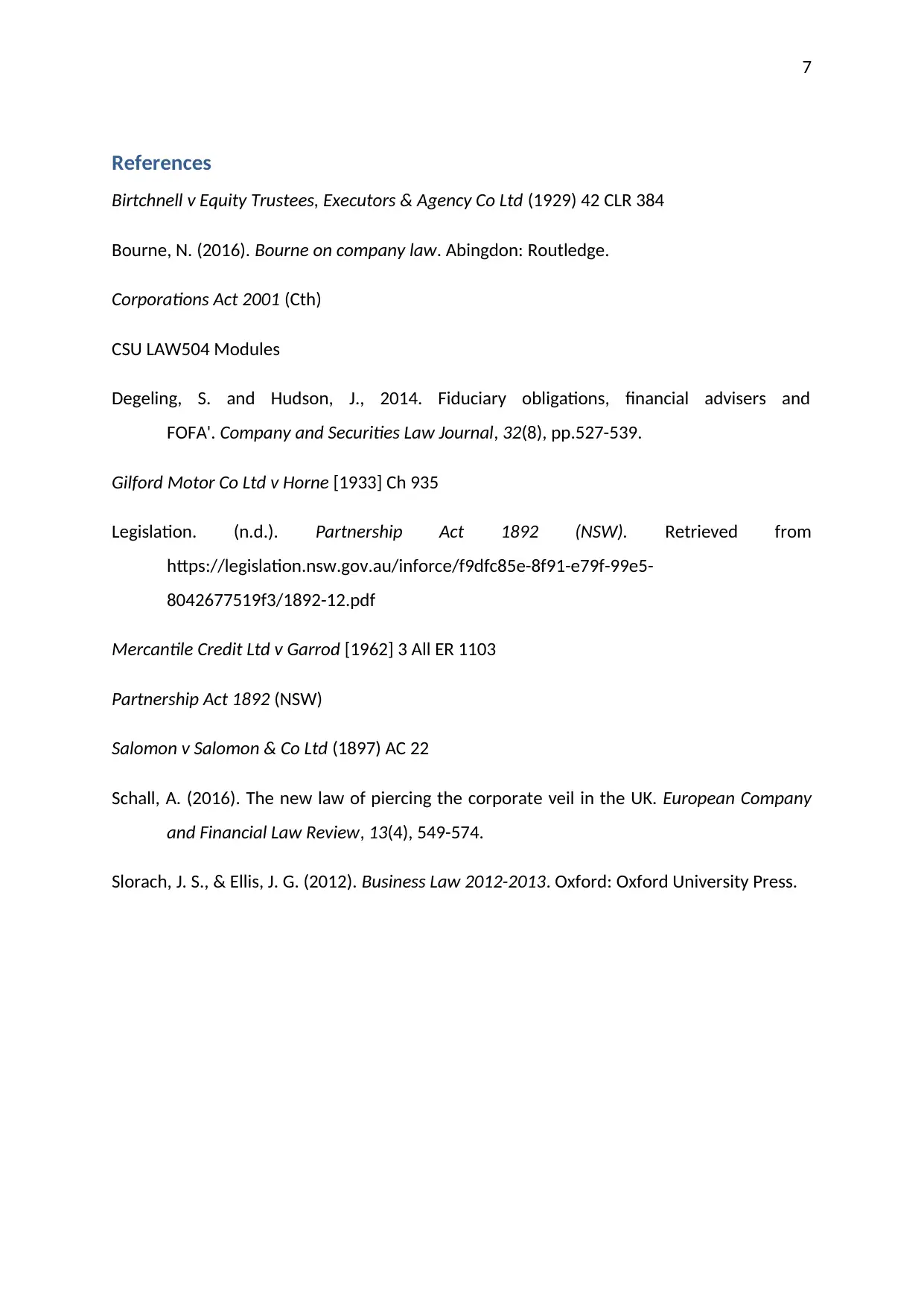
7
References
Birtchnell v Equity Trustees, Executors & Agency Co Ltd (1929) 42 CLR 384
Bourne, N. (2016). Bourne on company law. Abingdon: Routledge.
Corporations Act 2001 (Cth)
CSU LAW504 Modules
Degeling, S. and Hudson, J., 2014. Fiduciary obligations, financial advisers and
FOFA'. Company and Securities Law Journal, 32(8), pp.527-539.
Gilford Motor Co Ltd v Horne [1933] Ch 935
Legislation. (n.d.). Partnership Act 1892 (NSW). Retrieved from
https://legislation.nsw.gov.au/inforce/f9dfc85e-8f91-e79f-99e5-
8042677519f3/1892-12.pdf
Mercantile Credit Ltd v Garrod [1962] 3 All ER 1103
Partnership Act 1892 (NSW)
Salomon v Salomon & Co Ltd (1897) AC 22
Schall, A. (2016). The new law of piercing the corporate veil in the UK. European Company
and Financial Law Review, 13(4), 549-574.
Slorach, J. S., & Ellis, J. G. (2012). Business Law 2012-2013. Oxford: Oxford University Press.
References
Birtchnell v Equity Trustees, Executors & Agency Co Ltd (1929) 42 CLR 384
Bourne, N. (2016). Bourne on company law. Abingdon: Routledge.
Corporations Act 2001 (Cth)
CSU LAW504 Modules
Degeling, S. and Hudson, J., 2014. Fiduciary obligations, financial advisers and
FOFA'. Company and Securities Law Journal, 32(8), pp.527-539.
Gilford Motor Co Ltd v Horne [1933] Ch 935
Legislation. (n.d.). Partnership Act 1892 (NSW). Retrieved from
https://legislation.nsw.gov.au/inforce/f9dfc85e-8f91-e79f-99e5-
8042677519f3/1892-12.pdf
Mercantile Credit Ltd v Garrod [1962] 3 All ER 1103
Partnership Act 1892 (NSW)
Salomon v Salomon & Co Ltd (1897) AC 22
Schall, A. (2016). The new law of piercing the corporate veil in the UK. European Company
and Financial Law Review, 13(4), 549-574.
Slorach, J. S., & Ellis, J. G. (2012). Business Law 2012-2013. Oxford: Oxford University Press.
1 out of 8
Related Documents
Your All-in-One AI-Powered Toolkit for Academic Success.
+13062052269
info@desklib.com
Available 24*7 on WhatsApp / Email
![[object Object]](/_next/static/media/star-bottom.7253800d.svg)
Unlock your academic potential
Copyright © 2020–2026 A2Z Services. All Rights Reserved. Developed and managed by ZUCOL.





